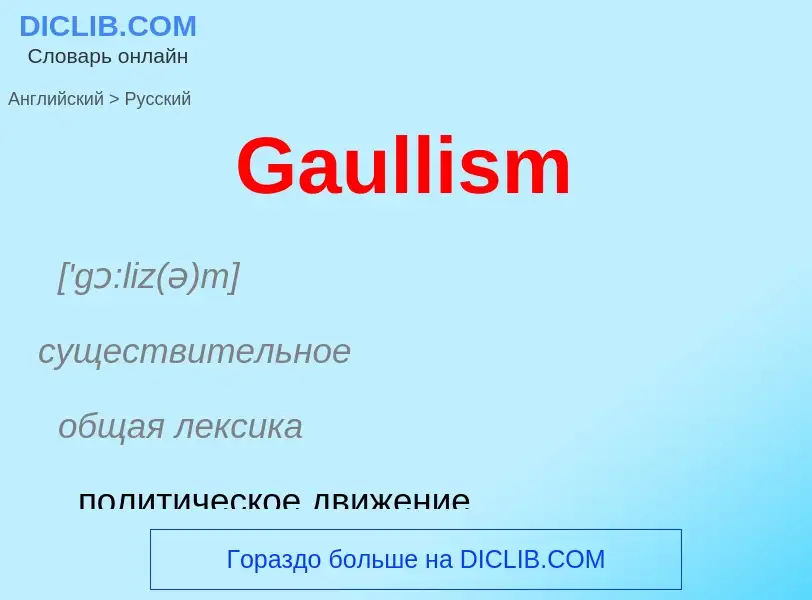Μετάφραση και ανάλυση λέξεων από την τεχνητή νοημοσύνη ChatGPT
Σε αυτήν τη σελίδα μπορείτε να λάβετε μια λεπτομερή ανάλυση μιας λέξης ή μιας φράσης, η οποία δημιουργήθηκε χρησιμοποιώντας το ChatGPT, την καλύτερη τεχνολογία τεχνητής νοημοσύνης μέχρι σήμερα:
- πώς χρησιμοποιείται η λέξη
- συχνότητα χρήσης
- χρησιμοποιείται πιο συχνά στον προφορικό ή γραπτό λόγο
- επιλογές μετάφρασης λέξεων
- παραδείγματα χρήσης (πολλές φράσεις με μετάφραση)
- ετυμολογία
Gaullism - translation to ρωσικά
['gɔ:liz(ə)m]
существительное
общая лексика
политическое движение
возглавляемое Шарлем де Голлем
принципы последователей Шарля де Голля
[də'gɔ:list]
существительное
политический термин
голлист (сторонник Ш. де Голля)
Ορισμός
Βικιπαίδεια

Gaullism (French: Gaullisme) is a French political stance based on the thought and action of World War II French Resistance leader Charles de Gaulle, who would become the founding President of the Fifth French Republic. De Gaulle withdrew French forces from the NATO Command Structure, forced the removal of Allied bases from France, and initiated France's own independent nuclear deterrent programme. His actions were predicated on the view that France would not be subordinate to other nations.
According to Serge Berstein, Gaullism is "neither a doctrine nor a political ideology" and cannot be considered either left or right. Rather, "considering its historical progression, it is a pragmatic exercise of power that is neither free from contradictions nor of concessions to momentary necessity, even if the imperious word of the general gives to the practice of Gaullism the allure of a programme that seems profound and fully realised". Gaullism is "a peculiarly French phenomenon, without doubt the quintessential French political phenomenon of the 20th century".
Lawrence D. Kritzman argues that Gaullism may be seen as a form of French patriotism in the tradition of Jules Michelet. He writes: "Aligned on the political spectrum with the right, Gaullism was committed nevertheless to the republican values of the Revolution, and so distanced itself from the particularist ambitions of the traditional right and its xenophobic causes". Furthermore, "Gaullism saw as its mission the affirmation of national sovereignty and unity, which was diametrically opposed to the divisiveness created by the leftist commitment to class struggle".
Gaullism was nationalistic. In the early post-WWII period, Gaullists advocated for retaining the French Empire. De Gaulle shifted his stance on empire in the mid-1950s, suggesting potential federal arrangements or self-determination and membership in the French Community.


.jpg?width=200)
